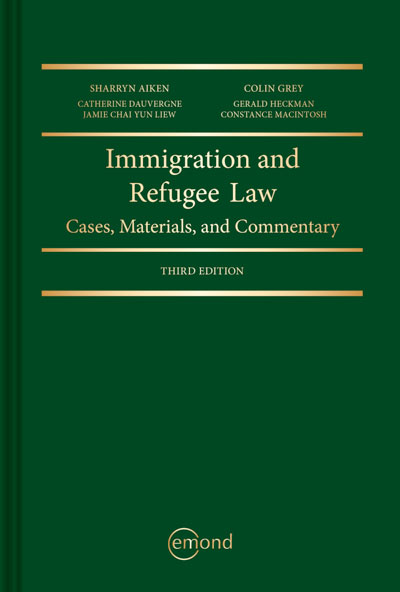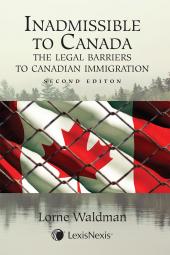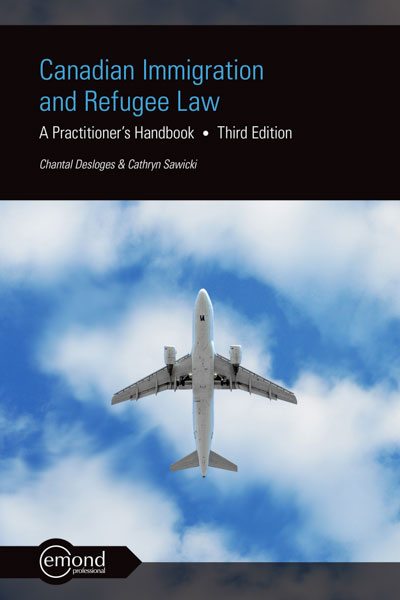
Not sure what to search for?
Try:
"Non-citizen"
"Refugee"
"Immigrant"
"Forced displacement"
"Newcomer"
Librarian
eBook Collections
These are only a selection of the many books available to you online!
-
The Criminalization of Migration by Idil Atak (Editor); James C. Simeon (Editor)
With over 240 million migrants in the world, including over 65 million forced migrants and refugees, states have turned to draconian measures to stem the flow of irregular migration, including the criminalization of migration itself. Canada, perceived as a nation of immigrants and touted as one of the most generous countries in the world today for its reception of refugees, has not been immune from these practices. -
"Not Good Enough for Canada"
Not Good Enough for Canada investigates the development of Canadian immigration policy with respect to persons with a disease or disability throughout the twentieth century. With an emphasis on social history, this book examines the way the state operates through legislation to achieve its goals of self-preservation even when such legislation contradicts state commitments to equality rights. -
Refugees Are (Not) Welcome Here by Azar Masoumi
State-controlled refugee protection in Canada has gone through paradoxical developments in recent decades. While refugee rights have expanded, access to these rights has tightened. Previously unrecognized groups - such as women experiencing gender-based violence and LGBT populations - are now considered legitimate refugees. Yet, the implementation of stringent administrative measures has made it harder for refugees to secure protection.
-
Advancing Social Rights in Canada by Martha Jackman & Bruce Porter (eds)
Canada is at a crossroads. The gap between our national self-image as a country that respects human rights and the reality of socio-economic inequality and exclusion demands a re-engagement with the international human rights project and a recommitment to the values of social justice and equality affirmed in the early years of the Canadian Charter of Rights and Freedoms. -
Immigration Law by Jamie Chai Yun Liew & Donald Galloway
Canadian immigration and citizenship law has been subject to frequent and seemingly frenzied revision and reformulation by the government of the day as it attempts to identify the country’s social, economic, and demographic needs and to respond to perceived threats to its sovereign control over Canada’s borders. This book builds upon the first edition as an introductory guide to immigration, refugee, and citizenship law. -
Refugee Law by Jones, Martin; Baglay, Sasha
Refugee Law is a concise account of Canadian refugee law, policy, and procedure. It presents refugee law as an independent system, yet one that is open to and influenced by other branches of domestic law, international law, the practices of other jurisdictions, and the general global trends in forced migration.
-
Allegiance, Citizenship and the Law by Helen Irving
Weaving together theoretical, historical, and legal approaches, this book offers a fresh perspective on the concept of allegiance and its revival in recent times, identifying and contextualising its evolving association with theories of citizenship. The book explores how allegiance was historically owed in return for the sovereign's protection but has been redeployed by modern governments to justify the withdrawal of protection. It examines allegiance from multiple perspectives, including laws for the revocation of citizenship, new ideas of citizenship education, the doctrine of treason, oaths of allegiance, naturalisation tests, and theories of belonging. -
Handbook on Migration and Social Policy by Gary P. Freeman (Editor); Nikola Mirilovic (Editor)
In this detailed Handbook, an interdisciplinary team of scholars explores the consequences of migration for the social policies of rich welfare states. They test conflicting claims as to the positive and negative effects of different types of migration -
The internally displaced person in international law by Adeola, Romola
Unlike refugees, internally displaced persons remain within the states in which they are displaced. Current statistics indicate that there are more people displaced within state borders than persons displaced outside states. Romola Adeola examines the protection of the internally displaced person under international law, considering existing legal regimes at various levels of governance and institutional mechanisms for internally displaced persons -
Migration and Global Governance by Alan Gamlen (Editor); Katharine Marsh (Editor)
In this noteworthy collection, the editors present the key articles published over the past twenty years which illustrate three related 'modes' of governing migration: a national mode, an international mode and a transnational mode. In recent years a new phase of migration policy-making has emerged: nation states, international organizations and NGOs have increasingly directed their efforts towards cooperative management of transnational flows and networks.
-
Interviewing Skills for Legal Professionals
Interviewing Skills for Legal Professionals is a resource designed to provide opportunities to learn and practice the essential legal skill of client-centred interviewing.
-
Immigration and refugee law : cases, materials, and commentary
 "This ambitious text explores the current state of Canada's evolving immigration system, surveyed in historic, social, and comparative contexts. Insightful commentary on racial, gender, and class dimensions contributes to a thorough and multi-faceted analysis"
"This ambitious text explores the current state of Canada's evolving immigration system, surveyed in historic, social, and comparative contexts. Insightful commentary on racial, gender, and class dimensions contributes to a thorough and multi-faceted analysis"
-
Colonial, Refugee and Allied Civilians after the First World War by Jacqueline Jenkinson
Following the First World War and in actions that challenged Britain's reputation as a liberal democracy, various government departments implemented policies of mass repatriation from Britain of populations of colonial and friendly migrants and refugees. Many of those repatriated had played a significant part in the war effort and had given valuable service in the combat zones and on the home front: serving in the armed forces, in labour battalions and employed in key wartime industries, such as munitions work, the merchant navy and wartime construction. This book sets out to uncover why central government decided to implement a policy of repatriation of "friendly" peoples after the war. -
Refugee Children by Charles Watters
The last twenty years have seen unprecedented numbers of refugee children entering Western countries. Many of these children will have experienced the atrocities of war and issues concerning their care and treatment are high on the agenda of research bodies, policy makers and service providers. Refugee Children is the first book to offer a wide ranging analysis of the context of care and the measures taken by nation states and intergovernmental bodies to address perceived problems. Drawing on a detailed examination of practices, the book outlines a model of good practice in the care of refugee children. -
Refugees and the Ethics of Forced Displacement by Serena Parekh
This book is a philosophical analysis of the ethical treatment of refugees and stateless people, a group of people who, though extremely important politically, have been greatly under theorized philosophically. The limited philosophical discussion of refugees by philosophers focuses narrowly on the question of whether or not we, as members of Western states, have moral obligations to admit refugees into our countries. -
Vigilantism Against Migrants and Minorities by Tore Bjørgo (Editor); Miroslav Mares (Editor)
This edited volume traces the rise of far right vigilante movements - some who have been involved in serious violence against minorities, migrants and other vulnerable groups in society, whereas other vigilantes are intimidating but avoid using violence. Written by an international team of contributors, the book features case studies from Western Europe, Eastern Europe, North America, and Asia.
-
Crossing Law's Border by Shauna Labman
Resettlement - the selection and transfer of refugees from the state where they seek asylum to another state - is considered a tool of refugee protection. In this nuanced account of Canada's resettlement program from the Indochinese crisis of the 1970s to the Syrian crisis of the 2010s, Shauna Labman examines the role that law plays in resettlement and the impact of resettlement on asylum policies. -
Interviewing Skills for Legal Professionals
Interviewing Skills for Legal Professionals, 2nd Edition is specifically designed to assist paralegals and other legal professionals in becoming effective interviewers. The quality of a client’s interview is essential to ensuring that the legal representation they receive is well-informed and tailored. -
Running on empty : Canada and the Indochinese refugees, 1975-1980
The fall of Saigon in April 1975 resulted in the largest and most ambitious refugee resettlement effort in Canada’s history. Running on Empty presents the challenges and successes of this bold refugee resettlement program. -
Strangers to Neighbours
As a leading country in global refugee resettlement, Canada operates a unique program that allows private groups and individuals to sponsor refugees. This innovative approach has received growing international attention, but there remains a need for a more expansive understanding of the sponsorship framework and its potential implications within Canada and across the world. Strangers to Neighbours explains the origins and development of refugee sponsorship, paying particular attention to the unintended consequences and ethical dilemmas it produces for refugee policy.
Databases
-
HeinOnline This link opens in a new windowHolds a wide selection of journals, books, case law and legislation.
Also includes:
*Selden Society Publications and the History of Early English Law
*Scottish Legal History: Featuring Publications of the Stair Society
*Air and Space Law
*John F. Kennedy Assassination Collection
*Executive Privilege
*Business and Legal Aspects of Sports and Entertainment (BLASÉ) -
CanLII (Canadian Legal Information Institute) This link opens in a new window
Provides access to court judgments, tribunal decisions, statutes and regulations from all Canadian jurisdictions.
-
Lexis+ Canada - for Law Students only (formerly Lexis Advance Quicklaw) This link opens in a new window
LexisNexis upgraded legal database for Canada with comprehensive primary and secondary sources. Includes access to Practical Guidance.
All new Law Students will need to register for this product. -
Westlaw Edge (Law Students Only) This link opens in a new window
Database of Canadian Law and legal research.
Law Students will need to register for this product.
Media
-
Last ChanceThis feature documentary tells the stories of 5 asylum seekers who flee their native countries to escape homophobic violence. They face hurdles integrating into Canada, fear deportation and anxiously await a decision that will change their lives forever.
-
Who Gets In?Who Gets In? explores the many questions raised by Canada's immigration policy in the face of one of the world's largest immigration movements. Shot in Africa, Canada, and Hong Kong in 1988, the camera reveals first-hand what Canadian immigration officials are looking for in potential new Canadians, and the economic, social and political priorities reflected in their choices.
-
BorderlinesPodcast by Steve Meurrens
-
Migration ConversationsMigration Conversations is a podcast that invites persons to share their migration stories. Hosted by Professor Jamie Liew, each episode is an in-depth conversation with people who have experienced the Canadian immigration system or other migration regimes up close.
-
The Refuge: A CYRRC PodcastThe Child and Youth Refugee Research Coalition's (CYRRC's) new podcast series, The Refuge, brings together youth with refugee experience, academics, and community partners to discuss issues affecting refugee children, youth, and families in Canada. (Connected to Dalhousie University).
-
Welcome Home: An Immigration Law PodcastFrom the publisher that brought you the Immigration Law Series, Emond Publishing presents Welcome Home: An Immigration Law podcast. Hosts Chantal Desloges and Cathryn Sawicki examine the current state of Canadian immigration law, breaking down policy, practice, procedure, and recent immigration cases from across Canada.
Other Links
-
Meet Garya plain language guide to preparing for a refugee hearing
-
Refugee Law Lab Reportera compilation of positive Refugee Protection Division decisions, which are otherwise not published








